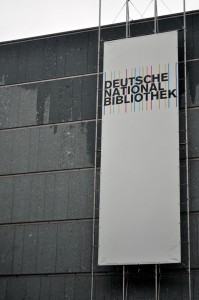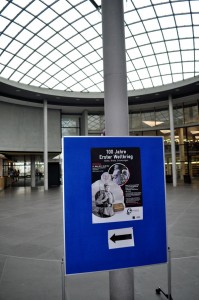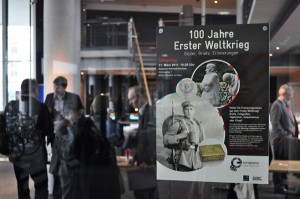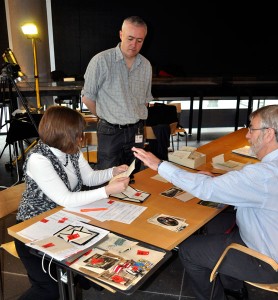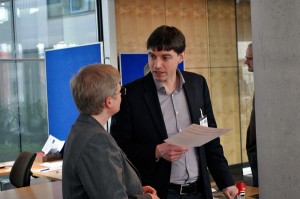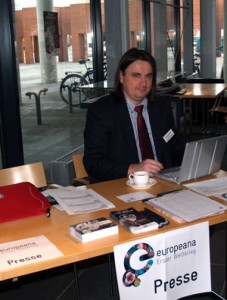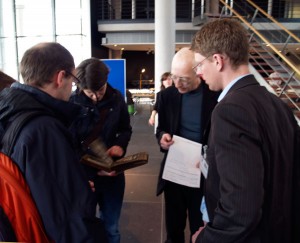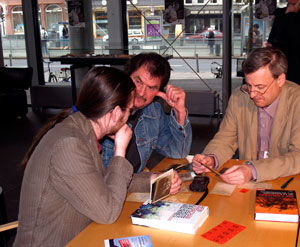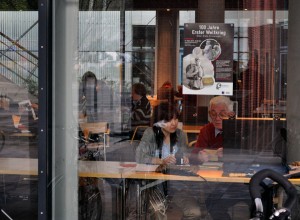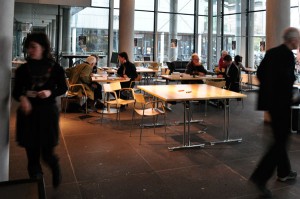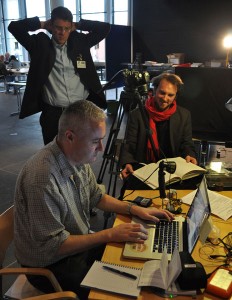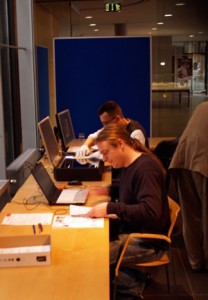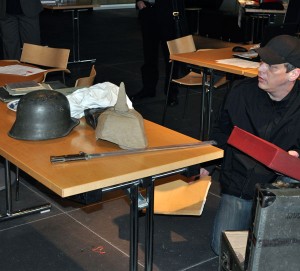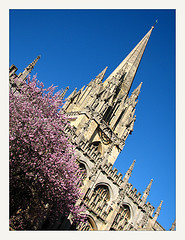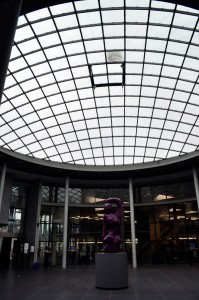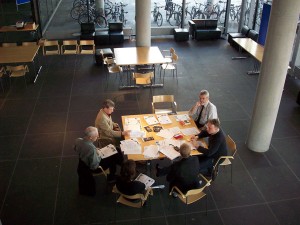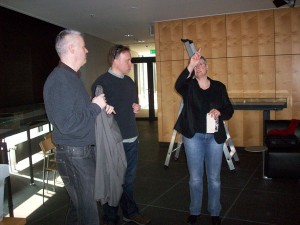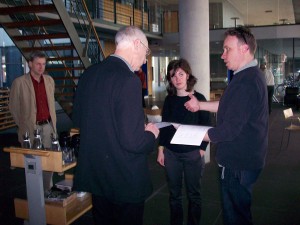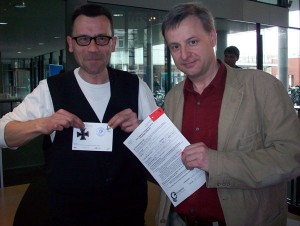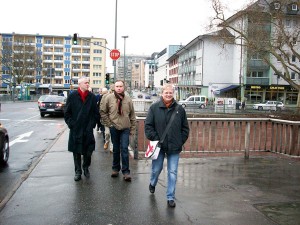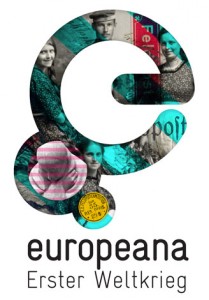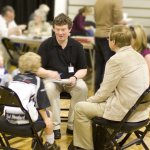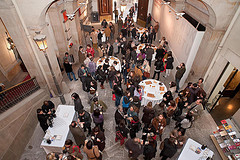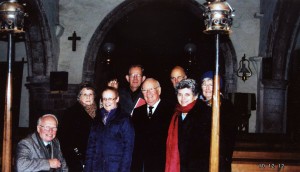We’ve been very busy since the last posting about the RunCoCo’s trip to help the DNB to crowdsource in Germany.

So in the meantime here is a transcript of an interview with Piers Scott from The Sociable http://sociable.co/:
Piers Scott, The Sociable: To begin, how did the RunCoCo project begin?
Alun Edwards, University of Oxford: RunCoCo began as a result of The Great War Archive. This was part of a JISC-funded project in the UK led by Oxford University to primarily focus on the poets of WW1. As part of that wider project, in 2008, we created a community collection of material owned by the public in the UK relating to the First World War. From scratch we designed software to collect material (called CoCoCo), we worked out how to run a submission day, the marketing campaigns, and so on. The success of this led JISC to fund RunCoCo. This funding has allowed us during 2010 to lead workshops to introduce the concepts of crowdsourcing and community collections. Delegates are from universities and local authorities and voluntary organisations, as well as consultants working with these. The presentations from these workshops are available from our website (audio, slides and some video), as well as guides and software created by RunCoCo. We’ve also run an online helpdesk, email runcoco@oucs.ox.ac.uk In addition we’re using Twitter and our blog to enter into conversations about this work and to maintain momentum.
You are in Germany running a digitisation roadshow with Europeana – how is this going?
We’re blogging about the project’s Germany trip, so you can keep up with our progress.
As of 11 April 2011 (when writing this) we are still travelling round Germany. RunCoCo has helped the Deutsche Nationalbibliothek (DNB) to run days where the public can come in and we can digitise their WW1 material, and hopefully tell them a little more about what they have. Tomorrow is our last submissions day – at the Württembergische Landesbibliothek / Bibliothek für Zeitgeschichte (12 April). When we started this we did not really know what to expect. We had run The Great War Archive in the UK, where the public’s knowledge about and reverence for the First World War is a way of life. In Germany we could not make the same assumptions. However, we have attracted between 50-120 members of the public to each event. Events were held in the DNB, Frankfurt on 31 March; Staatsbibliothek zu Berlin / Preußischer Kulturbesitz on 2 April; and in Bayerische Staatsbibliothek, Munich on 6 April. It is difficult to talk about figures until we have done some post-processing and started cataloguing, but for example, in one day in Frankfurt we took more photographs than in all the six submissions roadshows we ran in the UK; then in Berlin we took more photos than in Frankfurt. In Munich we took more photos than in Frankfurt and Berlin combined! Exhausting for the team – but extremely rewarding! When we’re ready the material we collect will be displayed on the website of the The Europeana project “Erster Weltkrieg in Alltagsdokumenten” (The First World War in everyday documents) http://www.europeana1914-1918.eu
How was the German response to the roadshow and project?
Very positive. The project is led by the DNB. The German librarians and historians are very knowledgeable about their audience and interested in the concept of a community collection, and the running of these submissions days. These days are attracting people who would never normally visit the venues, so the librarians are pleased with this foot-fall. The library managers are pleased with the incredible press response – when they normally battle for a column inch in the newspaper the “Erster Weltkrieg in Alltagsdokumenten” project has generated half-page colour photo stories in their local rag, all pointing to the fascinating stories being unearthed in this library. The local people are very happy to talk to the British team as well. I think that for the public the First World War is mainly seen as a tragedy and part of the long story of Germany starting in 1871, and still resonating after the fall of the Berlin Wall in 1989.
What are the challenges of collecting this information so long after the war?
Briefly, I should note we have just run a similar collection about the Anglo-Saxons (Woruldhord) so that was material over 1,000 years old! But for the First World War in Germany the main challenge is mobilising the community which is why Europeana and the DNB put so much effort into publicity. Then the challenge is selecting the useful material from the whole hoard we have unearthed in the public’s own collections.
The public contributed over 6,500 items for The Great War Archive in 2008, how did you manage this immense amount of data?
If you mean manage the data? Then we back-up and archive this in a university-service based in Oxford – so it is guaranteed safe storage. The metadata and the files were collected using standards therefore we are thinking about sustainability issues such as digital preservation and further interoperability, and potential for future mash-ups. The material was collected and is displayed under a JISC-HEFCE licence, roughly equivalent to CC BY-NC-SA. We display images etc. as low res, to keep file sizes under control. We deliberately kept the cataloguing simple – so that the public did over 50% of that job.
The Flickr account is still collecting images as part of the project, how useful have social networking sites been?
Flickr is an invaluable tool for networking with people who are interested in our subject. Not only do they contribute material to our Flickr pool, but they comment and add invaluable insight to the contributions of others. We will use Flickr to contact the wide range of people who have already digitised their own collections of material relating to WW1. We have used YouTube, Amazon, iTunes, Facebook (Old English; WW1 Poetry), and Twitter for The Great War Archive and the Anglo-Saxon project, and for RunCoCo I find I follow-up and read more material linked to from Twitter than from any other source (including email discussion lists).
Jonathan Purday, Europeana (interviewed by The Sociable in March) said that such efforts bring academics and individuals together, can this lead to new understandings of historical events?
Potentially yes. It also brings the public into a research project, and we have noted the wealth of expertise out there.
What resources can an organisation such as Europeana bring to this form of archiving?
Enthusiasm, and funding – and networking. We mention we would be pleased to work with Europeana in Germany – and Europeana know immediately 3-4 potential partners to approach. Jon Purday and his team provided the expertise for successfully marketing our project. Then Europeana have vast experience in multi-lingual cataloguing and aggregating metadata, as well as experience in digitisation and digital libraries.
One criticism of digital archives is that they remove the “authentic and the real connection” viewers get from museums with history, what would you say to this point-of-view?
The items we have collected were not on display! So this has to be counterbalanced against the fact that nobody could see this stuff and it was in danger of being lost, so we are opening access. I would also strongly question whether any museum is ‘authentic’ – it’s always a selection based on the curator’s ideas of what is representative, but it often consists of displays that show the same material again and again. We are exposing the new.
How can people or organisations work with RunCoCo?
In the short-term – please come to our conference – ‘Beyond Collections: Crowdsourcing for public engagement’, University of Oxford 26 May 2011. The conference website is available now for registration at: http://www.oucs.ox.ac.uk/ltg/events/beyond2011/
Also read our blog, talk to us on Twitter. Look at the guides we will be publishing online soon, and read about our previous presentations and workshops. Finally, we may be able to help any project on a consultancy basis – in the same way that we have helped the DNB and Europeana. We have experience of and contact with crowdsourcing and community collections projects on every conceivable academic topic – some using extremely high tech engagement tools to work with hundreds of thousands of volunteers, some engaging face-to-face with their small community.
What would you say to people or organisations who wish to take part in, or set up a similar project?
Do it, crowdsourcing can work! Be prepared but don’t over-think the problem.
What is next for RunCoCo and the europeana1914-1918 project?
For RunCoCo who knows… There is our conference in May, there are a wide variety of community projects funded by the JISC 2010-2012 who may contact us for assistance. And we are passionate about involving the public in the forthcoming events surrounding the commemoration of the centenary of the First World War.
The www.europeana1914-1918.eu project has generated a lot of interest in many countries across Europe, and we trust that keeping the collection open online in Germany, means that we are confident that we can roll out the same collection mechanism and run similar public submissions days in any countries involved in that conflict.
Is there anything else you would like to add?
Please visit the project website www.europeana1914-1918.eu, enter in to a conversation with RunCoCo, and look at our funders for this current work – Europeana, and our UK funders JISC.








